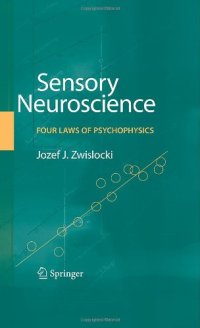
Ebook: Sensory Neuroscience: Four Laws of Psychophysics
Author: Dr. Jozef J. Zwislocki (auth.)
- Genre: Economy // Law
- Tags: Behavioural Sciences, Otorhinolaryngology, Neurosciences, Ophthalmology, Philosophy of Mind
- Year: 2009
- Publisher: Springer US
- Edition: 1
- Language: English
- pdf
Sensory Neuroscience:Four Laws of Psychophysics examines both psychophysics, the science of relationships between human sensations, and the stimuli that evoke them. More specifically, it defines four multisensory relationships of great generality between sensation magnitudes and the underlying stimulus magnitudes.
Although, psychophysics belongs to sensory neuroscience and is strongly coupled to neurophysiology, it also has branched out to various specialized academic fields, including the sciences of vision and hearing, ophthalmology, optometry, otology, and audiology. Due to this diversification and fragmentation psychophysics has had an ad-hoc, phenomenological orientation and, besides the Weber law of differential sensitivity, has lacked a systematic grid of scientific laws. Through contributions from distinguished researchers in this field, Sensory Neuroscience:Four Laws of Psychophysics, provides valid unifying principles and systematic applications to this otherwise fragmented precursor of experimental psychology. This book will be particularly useful to auditory researchers, behavioural neuroscientists, and experimental psychologists.
Dr. Jozef Zwislocki holds a Sc.D. degree from the Swiss Federal Institute of Technology and two Dr. h. c. degrees from the Adam Mickiewicz University in Poland and Syracuse University respectively. He is a member of the American and Polish Academies of Sciences and the recipient of numerous research awards. Dr. Zwislocki started his research career as the director of the electroacoustic laboratory in the department of otolaryngology of the University of Basel, Switzerland. From 1951 to 1957, he was a research fellow at Harvard’s Psychoacoustic Laboratory in the department of Experimental Psychology before joining the Faculty of Syracuse University. There, he organized and directed in succession the Bioacoustic Laboratory at the G. D. Hoople Hearing and Speech Center, the Laboratory of Sensory Communication, and the Institute for Sensory Research at the L. C. Smith College of Engineering. He has held the position of a research professor of otolaryngology and communication sciences at the State University of New York Upstate Medical University. Though he retired from his directorship at the Institute in 1984, he is currently continuing his research work as both a distinguished professor of neuroscience emeritus at Syracuse University.
Sensory Neuroscience: Four Laws of Psychophysics organizes part of psychophysics -- a science of quantitative relationships between human sensations and the stimuli that evoke them. Although psychophysics belongs to sensory neuroscience, and is coupled to neurophysiology, it has also branched out to various specialized disciplines, including the disciplines of vision and hearing, ophthalmology, optometry, otology, and audiology. Due to this diversification and fragmentation, psychophysics has had an ad-hoc, phenomenological orientation. Besides Weber’s law of differential sensitivity, and the still-controversial Stevens’ power law, it has lacked a systematic grid of scientific laws. Sensory Neuroscience: Four Laws of Psychophysics provides valid unifying principles and systematic applications for this otherwise fragmented precursor of experimental psychology, and defines four multisensory relationships of substantial generality between sensations and the underlying stimulus variables. This book will be particularly useful to auditory researchers, experimental psychologists, and behavioral neuroscientists.